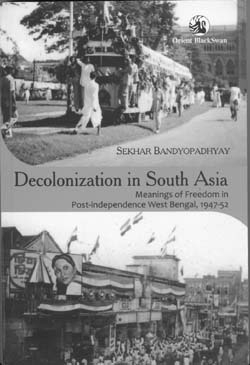Sekhar Bandyopadhyay, Professor of Asian History at Victoria University of Wellington, New Zealand, has earlier enriched our understanding of South Asian history by his ground-breaking research on the complex relationship between caste, society and politics. In one of his widely acclaimed books he has encapsulated the history of India from Plassey to Partition. But this time he has shown a proclivity to traverse the less trodden terrains of Indian history. A survey of modern Indian historiography shows our historians’ obsession with South Asian history till 1947. An integral part of this experience is of course Partition. Partha Sarathi Gupta made a cautionary note in his Presidential Address to the Indian History Congress in the late nineties that ‘Indian history did not end on 15 August 1947’. Still, apart from a few exceptions such as Bipan Chandra, Mridula Mukherjee and Aditya Mukherjee, Sugata Bose and Ayesha Jalal, Ramchandra Guha, S. Gopal, Stanley Wolpert, Judith Brown and Benjamin Zachariah, we do not notice much scholarly engagements with postcolonial India. And again, we shall see that half of these works are general histories of postcolonial India and the rest are political biographies of her first Prime Minister.

Less Trodden Terrains
Amit Dey
DECOLONIZATION IN SOUTH ASIA: MEANINGS OF FREEDOM IN POST-INDEPENDENCE WEST BENGAL, 1947-52 by Sekhar Bandyopadhyay Orient Blackswan, 2013, 254 pp., price not stated
October 2013, volume 37, No 10
